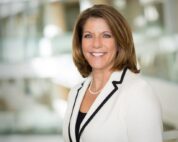Virginia Chamber elects UVA Health exec as board chair
The Virginia Chamber of Commerce on Wednesday elected Jennifer Siciliano to chair its board of directors this year.
Top Five: October 2025
The top five most-read daily news stories on VirginiaBusiness.com from Aug. 9 through Sept. 9 included news of a new medical school launching at the University of Mary Washington. 1 | Virginia Chamber CEO resigns after 4 months After serving as the Virginia Chamber of Commerce‘s president and CEO since April 1, Cathie Vick left […]
Virginia Chamber appoints interim CEO
The Virginia Chamber of Commerce Board of Directors announced that it has appointed former chamber executive Keith Martin as interim CEO.
Virginia Chamber CEO resigns after 4 months
Cathie J. Vick has resigned as president and CEO of the Virginia Chamber of Commerce after only four months on the job.
Va. Chamber of Commerce reveals next president and CEO
Cathie J. Vick will be the new leader of the Virginia Chamber of Commerce, starting April 1. The business advocacy organization with more than 30,000 members announced on Tuesday her appointment as president and CEO. Vick is currently vice president of corporate and government affairs at Transurban, one of the world’s largest operators and developers […]
Va. Chamber president and CEO to retire
Virginia Chamber of Commerce President and CEO Barry DuVal plans to retire in early 2025, the chamber announced Thursday. DuVal became head of the chamber in April 2010. During his 14-year tenure, the business advocacy organization has grown from around 1,000 members to more than 32,000. “During his tenure with the Virginia Chamber of Commerce, […]
Virginia Chamber elects Va. Natural Gas president as board chair
The Virginia Chamber of Commerce has elected Robert Duvall, president of Virginia Natural Gas, to chair its board of directors, the chamber announced Thursday. Duvall succeeds Lakshmi Williams, North American general counsel of Transurban, who chaired the board in 2023. Duvall’s term as chair will last a year. At Virginia Natural Gas, Duvall is responsible […]
Economic Development 2023: BARRY DuVAL
DuVal, who has led the Virginia Chamber since 2010, oversaw the launch this summer of the chamber‘s WiseChoice Healthcare Alliance, a multiple employer welfare association to offer health care plans for small businesses. Made possible through new state legislation, WiseChoice was the first such self-funded health insurance consortium in Virginia. A longtime advocate for Virginia’s [&he[...]
Virginia Chamber appoints Transurban exec as board chair
The Virginia Chamber of Commerce has elected Lakshmi Williams, North American general counsel for Transurban, to serve as the 2023 chair of the chamber’s board of directors. Her term will last one year. Based at Transurban’s U.S. headquarters in Tysons, Williams joined the Virginia Chamber‘s board in 2018 and has served on the executive board […]
Barkin: Inflation improving but not yet low enough
With inflation decreasing but still not at its 2% target, the Federal Reserve still needs “to stay on the case,” Federal Reserve Bank of Richmond President and CEO Tom Barkin said Thursday at a conference hosted in Richmond by the Virginia Bankers Association and the Virginia Chamber of Commerce. Inflation continued to slow in December […]
Barkin: To address inflation, U.S. must rethink labor
As the U.S. moves to a short-labor environment, it will be necessary for businesses, governments and nonprofits to reassess their approach to labor, Federal Reserve Bank of Richmond President and CEO Tom Barkin said Friday in Richmond. Speaking at the Virginia Chamber‘s 2022 Virginia Economic Summit and Forum on International Trade, Barkin said that although […]
Youngkin promises biz-friendly climate for Va.
Talent, taxes and regulations, broadband access and energy are the top concerns for Virginia businesses, according to survey results gathered for the Virginia Chamber of Commerce’s Blueprint Virginia 2030, an action plan for strengthening Virginia’s economy. And those are also priorities for Gov.-elect Glenn Youngkin, he said Friday in a speech during the Virginia Economic […]






















